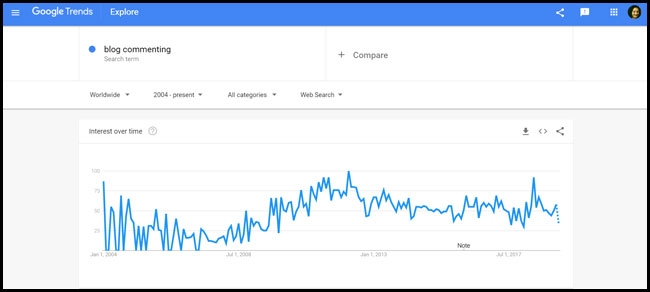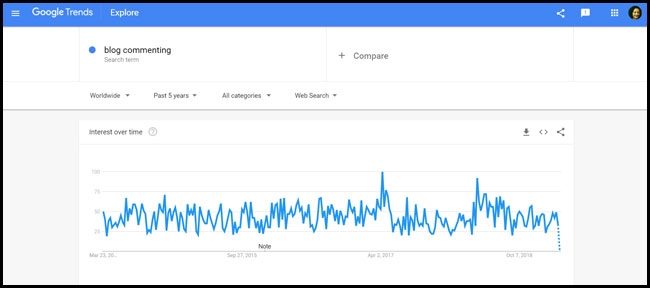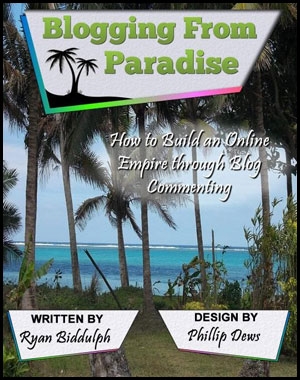
Blog Commenting Delivers The Big Four Gains: Traffic, Engagement, Brand Awareness and Brand Authority
After Matt Cutts (of Google’s anti-spam team) gave us a thumbs-down on blog commenting, people who had been mindlessly, and rabidly, building backlinks from blog commenting suddenly realized that Google was going to frown upon any activity done “just for backlinks”.
Many high authority blogs, in fact, shut down their comments features so as not to attract the kind of user-generated comments that are considered low-quality fodder, or punishable by Google. So we’re now left with the question: Is blog commenting still worth it?
When I asked around, I expected to draw at least a few negative responses to blog commenting, but I am surprised that NO ONE really has decided to drop it as a worthless marketing idea! If anything, there still seems substantial positivity about blog commenting.
At Solohacks Academy, we ourselves have gained massively from the idea that blog commenting is one of those booster marketing techniques with massive influencer-network-building value.
1. Expert Opinions And Case Studies With Blog Commenting
Before launching directly into blog commenting, it pays to know what the current popular opinions of the experts are on blog commenting. Learning from what they say is half the game conquered. The rest is up to the actions you can take to benefit from blog commenting as a strategy and a tactic.
a. Despite Matt Cutts’ Video, Google Trends Still Shows A Healthy Graph For Blog Commenting
Matt Cutts, who has always been the gospel of all things SEO, suddenly released a video that sounded like the beginning of the end of blog commenting. Notice carefully, that he wasn’t saying “stop blog commenting” … he was just saying “don’t do it for the wrong reasons”. Nevertheless this video caused quite a stir. Here it is for those who missed it …
But here is something else to notice. Despite Matt Cutts’ video, though, Google trends still shows a healthy graph! I thought the best place to check if blog commenting was really a waning interest was Google Trends, but was surprised to catch this continuing deep enthusiasm from searchers specifically in “blog commenting”…
See this first Google trends graph below showing the trend from 2004 till date. Around the time of Matt Cutts’ video, it was 2010, when clearly there was a heavier use for blog commenting (no doubt for backlinks). Just after the Matt Cutts video though, there’s was a dip in the popularity of blog commenting, but not for long. Soon things stabilized, and those who were using blog commenting responsibly just continued.

The second graph below shows how steady the trend has been, even in this last year! The blog commenters are nowhere near easing up! Maybe the right ones are continuing for the right reasons!

b. Two Case Studies That Show How Blog Commenting Can Work Wonders
Neil Patel, the SEO expert, in an article in early 2014, seemed to sum up the new attitude towards blog commenting. He suggested that looking at blog commenting purely for link-building is the big mistake.
Relying on link-backs instead of content? Link-backs, while important, are not the only component of SEO. There is a delusion that merely throwing a lot of links to a site will magically bring massive authority, high rankings, and tons of search traffic. That’s simply not the case. Truly effective SEO is about the sum of several parts — not one or two techniques pushed to the extreme.”
Later that year, Neil Patel also wrote another truly inspiring article titled “How I Generated $ 25,000 with 249 Comments“. He had conducted a small research on blog commenting and found his premise supported – that focus needs to be on using the blog commenting tactic for traffic building (and sales!) and not link building.
It’s no secret that you can generate traffic by commenting on other people’s blogs. But the question is are you actually using this tactic? Chances are you aren’t. To show you the benefit of leaving comments on other blogs, I decided to run a test in which I left 249 comments on other people’s blogs in the month of October. Those 249 comments resulted in 3,973 visitors and 6 consulting leads. And although I don’t do much consulting, I was able to turn one of those leads into a $ 25,000 corporate speaking gig.”
Another motivating case study comes from Dana Tan in the Moz.com blog in a post titled “How Blog Commenting Can Still Be a Healthy Part of Your Post-Penguin SEO Strategy [Case Study]“. She had left a comment on a blog (albeit with a mis-spelt URL link) but was then surprised to find her five minute commenting effort turn out into something far bigger than she’d expected!
Two days later, on October 10th, I got an email notification that there was a new post on this very same blog. Not only that, but the topic was about the very same product as the one where I had left my comment. Of course I went to read it. What I found was an entire blog post from the same author stating how my comment, and the recent experiences of a friend of his, had completely changed the way he viewed the product. He not only quoted my entire comment, he included my original anchor text with the link and he fixed my anchor text typo!
So by writing a thoughtful comment, I actually spurred a unique blog post featuring my link and my anchor text (only now it’s not misspelled). It took me maybe five minutes at most to write my original comment and now I have not one but two solid links from this highly-relevant blog. I didn’t have to write to him, ask him, beg him, pay him or link back to him. All I had to do was care, write, inspire more discussion and be genuine.
You see, blog commenting can still work. It can work in amazing ways. You just have to really care about the topic and be real when you write your comment. So go right now and find ten interesting blogs related to your industry. Search in Google Blog Search, or pull all of your Twitter followers into a spreadsheet using Followerwonk and find all the bloggers. Find an interesting thread and post a thoughtful comment. You might be surprised to see what happens next!”
c. The Man Who Wrote THE BOOK On Blog Commenting Has This To Say! Read Ryan Biddulph …
(Just click on the image to buy.)
Far and away, the best book I have ever come across on blog commenting as a powerful way to build a business empire comes from Ryan Biddulph, and it’s titled “How To Build An Online Empitre Through Blog Commenting”.
(Chances are you’ve seen Ryan Biddulph’s name several times over, writing articles for some of the biggest online publications of repute.)
Here’s a reasoning from Ryan, in his own words, on exactly how blog commenting works wonders to build your business. Who can argue with this …?
You can write an entire eBook about blog commenting? Yes, yes you can. I need to give my fiancee Kelli props. She penned the first few lines. Or at least she gave me the idea for the first few lines. To begin with, people are stunned if I tell ‘em I write 5 paragraph or longer comments. Mind boggling stuff to them.
Imagine writing an entire eBook explaining how to build an online empire through blog commenting? I can see the steam flowing out of bloggers’ ears right now. I get it. I really do. I was once a guy with ‘no time to comment.’ Fast forward a few years. I decided that blog commenting was the smartest, most effective way to build friendships, expand brand awareness and grow my online empire.
After commenting persistently I:
- Received a tweet-worthy eBook (“Blogging from Paradise: How to Retire to a Life of Island Hopping through Smart Blogging”) endorsement by New York Times Best Selling Author Chris Brogan
- Have been invited to speak to a marketing class at prestigious NYU
- Have received an eBook endorsement from top earning blogger Yaro Starak
- Have island hopped from paradise to paradise, visiting places like Fiji, Bali, Phuket, Koh Lanta and Penang, Malaysia over the past 40 months
- Have built a blog which has funded my travels and has also padded my savings
- Have been featured on over 30 authority blogs in 12 weeks
What marketing strategy played the biggest part in my online success? Why blog commenting, of course. I run a cool blog. I use social media marketing to spread the word, to inspire folks to blog from paradise. I built an online empire through a few channels/strategies yet I needed that connecting factor to manifest success. Blog commenting was the tool I used to connect with authority figures. You share your opinion hundreds of times daily, as is…..why not eloquently share your opinion on relevant, authority blogs to build bonds with pros? Bonds which can help you blog from paradise, or from wherever you want to live.
Robert Kiyosaki says that wealthy people build networks and all other folks look for work. Wealthy, free people connect with pros. Pros inspire you, support you and expand your presence at an exponential rate. You can imagine what Chris Brogan’s tweet endorsement did for me. It never hurts to have a guy who’s a business advisor for Google, GM, Disney, Tony Robbins, Richard Branson and Paulo Coelho tweet out your eBook. I popped up on Chris’ radar through the comments field on his blog. Here’s the kicker; I didn’t ask Chris Brogan to tweet endorse my eBook. He did it for me. Neat, how sowing and reaping works, as well as the benefit of being detached from outcomes.
Blog commenting helped me land an NYU speaking gig too. I’m speaking to an NYU marketing class via a Google Hangout in December 2014. My good friend and NYU Professor Matthew Capella asked me to speak and has even made the monetization chapter from my first Blogging from Paradise eBook part of the class syllabus. Again, blog commenting was the glue which solidified our bond.
I’m humbled, and honored and flat out floored by these accomplishments. Blog commenting can open a world of prospering opportunities for you.”
Hey guys, I could go on and on quoting from Ryan, but he may sue me for “over-liberal pinching”. So I’ll stop here. You may have got it that I am a great fan of Ryan and his blog commenting method of networking with the biggest and the greatest. But if you want the rest of the priceless advice, go buy his book. What is the small price for the secret path that can make you millions? Click on the book cover above and go buy success!
2. Three Ways In Which Blog Commenting Increases Your Brand Recognition And Reach
Among the best things about blog commenting is that it can help you connect with influencers, promote your brand visibility, and even let you debate with competitors on their own turf. Read on to see how to achieve all this …
a. Blog Commenting Can Give You Direct Access To Warm Up Valuable Influencers For Later Benefit
Influencers may be busy people, but even they, no matter how high up the pecking order they are, love to get comments on blog posts. The more comments a post gets, the more the post has peer-and-public validation. People love to know that others are provoked and motivated and engaged enough to participate in their blog posts, because that is the very objective of content marketing i.e. engaging readership.
It helps immensely if you cultivate networks of contact with established bloggers, pros and influencers by first commenting on their posts (with wisdom, thought, depth and authenticity) so that later when you send them an outreach email to promote your blog posts, they know you already as the person who most often adds value and great points to their own posts.
Blog commenting is also about participating in a community of sharply focused mutual interest. Blog comments are no less than mini forums built around a specific topic. The key here is to choose blog posts wisely. Don’t just go for any post if you see the Domain Authority of the site is high. Many sites with high DA don’t always offer posts of the kind of quality you may want. Likewise don’t comment just because the author is a big name. But if the big-name author has done a fabulous post in your area of brand authority, that’s the post to comment on.
Find that intersection – of posts by strong names in the business, writing on your topic of expertise, and catering to those who may also be your target audiences.
b. The Quality Of Other Comments And The Original Blog Post Can Reflect Well On Your Brand
Many experts advocate that the best way to post comments is to be the first one to post – for that is the comment most read and then traffic follows your website link to see who you are. But this approach has its pros and cons. If you are the first to post, you don’t know if the people who post after you in the comments section will raise the value of the comments and the post, or lower it with rubbishy contributions.
I’d say: Try to be one of the earlier ones to post, but let one or two precede you, so you get a measure of how the comments section is getting populated. Or else study the other posts of the author and make a shrewd guess as to the caliber of his regular commenters, and then decide to be the first with his next post.
How to be the first to post a blog comment on a great post? Brian Dean, the SEO and backlinks expert, has a great idea. He suggests that you pile up a list of sites you’d like to comment on in Feedly (the RSS aggregator).
Feedly not only shows you the list of posts of your favorite authors and URLs neatly arrayed, but also shows when each post was created, and lets you comment on the post from within Feedly. So if you set up “alerts” in Feedly, you can get tipped off to be the first to comment when a new post that fits your bill comes along.
Aside from being early to comment, another very important thing to realize is that it’s easier for a blog commenter to raise his brand power by several notches with a well-constructed comment, than it is for the author of the post.
The author has to slog to make his point, and write several thousand words. The commenter needs just a paragraph or two of “incrementing smartly upon the content” to piggy-back on the author and carry away some of his brownie points.
c. Comments Can Sometimes Be More Valuable Than The Original Article – And A Competitive Tactic
Don’t forget that blog commenting may also offer you a subtle way to reposition your competition. You should definitely not make a habit of trashing competitor posts with your blog comments, just to make yourself look big to their readers (who may also be your potential customers) … but sometimes a mildly argumentative or contrarian position to the original post may spark a vibrant debate and make people ask “Who’s this person?”.
Your comment may allow readers to silently gauge your caliber against the competitor (the author).
When using this tactic, however, keep within the red lines of decency and etiquette, and don’t labor the counterpoint. And always have something good to say to counterbalance any adversarial view.
One other thing: if you find blog commenting working well for you against competition, don’t go blindly after every post by every competitor remotely in contest with you. Choose one or two of the topmost competitors in the pile and make the points you want on their blogs, without sounding like you are their enemy.
Sound like you are offering a contrasting view, while also complimenting them for their view. Then leave it to the public to judge whose opinion matters to them.
By choosing only the best competitors to comment on, you naturally show readers that you rank with the best in the niche, and have something valuable to add to what the best have said – or left unsaid – on the topic they have written about. That much is good commenting. Pushing your point with too much vigor, though, is a bit too aggressive or unsavoury, in terms of commenting etiquette.
3. Three Ways To Do Blog Commenting Without Wasting Your Opportunities
Treat every chance you get to comment on a top blog post as an opportunity. We’ve put together some things you should do to increase your comment-productivity – and some things you shouldn’t do that may erode your brand value.
a. Interactive, Engaging Comments Are A Positive Vote For A Post – Valued By People And Google
Did you know that Google still views comments as part of your content marketing, even if the backlinks are of no use? In your overall content marketing strategy you should include blog comments just as you would your social media updates. They too are a form of “social content layering”, say experts, and add to the visibility, presence, and expertise you convey online.
In terms of length, I’d say they should be longer than Tweets and shorter than posts. About 150-300 strong words, well thought out and well presented, can build a strong case for your own brand authority, showcased in the context already painstakingly created by the post author. Leaving a good comment can make people – and Google – pay attention.
Now this begs the question: What does a good blog comment look like? More to the point, here are four things, according to Kevin J. Duncan, that good blog comments should not be like:
You should not use a blank avatar image
How often have we seen those “greyheads” or empty avatar boxes without a human face in them? Does that make you want to read the comment or do you feel like bypassing the comment to read another one, with more credibility because it is accompanied by a gravatar image? No matter how smart your comment is, it will get no second looks unless it feels like it’s coming from a real someone who has a face to show. Worse still, don’t betray low self-esteem in public by using a headshot downloaded from a stock photo site instead of your real face. People can spot a model’s face a mile away. All this erodes credibility. It’s better you don’t comment at all, if you’re hesitating to do so with your real persona.
Try to avoid using your nickname, however funny it is
Does any professional worth his salt call himself “James Sinclair (aka Pimply)”? Let your close friends and family call you what they like, but why bring in the nickname when you want people to take your comment and subject authority seriously? Trying to be too cute backfires in business. As Kevin Duncan writes, “…unless you’re a spy, or in witness protection, you should use your real name.”
Don’t load the body of your comment with gazillion hyperlinks
That’s like telling people, “Never mind my comment, I’m here for all the backlinks I can get.” If the author of the post has set up for comments to be moderated by him, he sure as hell is going to send your comment to the trash bin because your motives in commenting are clearly dubious. Or, even if the author doesn’t moderate your comment, an anti-spam plugin like Akismet will automatically send “over-hyperlinked” comments to the spam folder.
Don’t ever comment after reading just the first two lines of the post
The author of the post may have an opening paragraph that he then goes on to question and critique through his post. Unless you’ve at least skimmed most of his post, you’re not going to get the entire drift of his arguments. The most betraying thing of all is to make a comment after reading barely a line or two of the article, and assuming you know what the article is about. The author won’t ever thank you for it, nor will he ever entertain any more of your commenting. If he’s an A-list influencer, you’ve lost the linkup with him forever.
b. As Few As 1% Of All Blog Comments Are Valuable And Productive, But That’s Your Opportunity
Julie Neidlinger writes in her article, “10 Reasons You Should Be Using Blog Comments”, in the CoSchedule blog that:
In a little over eight years, Copyblogger has published more than 130,000 approved comments. Which is pretty amazing, right? But over that period, that’s only about 4% of the comments that were left on the site. The remaining 96% were pointless, time-wasting spam.”
In another interesting article “The Ridiculous Power of Blog Commenting”, the author A. J. Kohn writes:
To understand why blog commenting is so powerful you first need to grasp the concept of participation inequality. In most online communities, 90% of users are lurkers who never contribute, 9% of users contribute a little, and 1% of users account for almost all the action. You might also hear this concept referred to as the 90:9:1 Principle or The 1% Rule. When I explain it to people I refer to these groups as Lurkers, Reactors, and Creators respectively. Creators hang out in the comments section.”
What these experts mean is that people who are productive, active, engaged, and valuable content producers and consumers are the ones that take the trouble to comment with quality. No prizes for guessing that that is where you too should hang out, to be in the right company of peers and potential customers who matter.
c. Blog Comments, Used Cleverly, Can Lead Traffic To Specific Landing Pages On Your Site
There are four good practices to follow when you fill the comment form of a post.
One, do not use your brand or company or website name to make the comment. Instead, opt to use your own original name in full. Comments should be from, say, “Sarah Anderson”, accompanied by a Gravatar picture for authenticity and branding strength … and not from just “Sarah” (too informal, no brand authority) or “XYZ Company” (too impersonal and sales-y). People like to hear the views of people, and that rubs off on your business.
Two, in the website field of the comment form, it’s not mandated that you have to fill in just your website homepage URL. In fact, Neil Patel suggests you can use a URL to one of your landing posts or pages if you want traffic to arrive there.
Three, try not to add more than one link in the comment body (and even that, only if you absolutely must and it’s tremendously relevant to the point you are making). It’s smarter to link to an external valuable site than your own to show you research in high circles.
Four, do not be tempted to use underhand tactics like “hidden links” in comments (where you put in a link but have no anchor text and so it doesn’t show up to a reader at all, but tries to become a link in Google’s eyes!) I needn’t tell you that comment-spam-detector plugins like Akismet can pick up that trick, and so can Google. And if that happens, you’ll be in a dark corner forever before you know it.
In Summary …
- Blog commenting delivers the big four gains: traffic, engagement, brand awareness and brand authority.
- Before launching into blog commenting, it pays to know the popular opinions of the experts on blog commenting.
- Blog commenting can give you direct access to warm up valuable influencers for later benefit.
- The quality of other comments, and the original blog post, can reflect well on your brand.
- Comments can sometimes be more valuable than the original article – and a competitive tactic.
- As few as 1% of all blog comments are valuable and productive, but that’s your opportunity.
Digital & Social Articles on Business 2 Community
(79)








